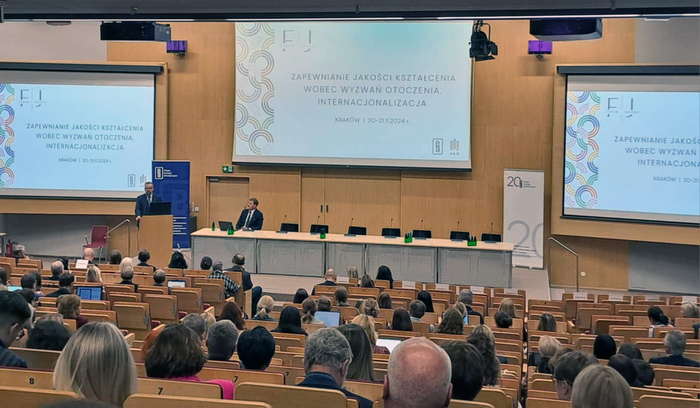Delegation from the MUG attends conference on the internationalization of education
26.11.2024
Ewa Kiszka, Monika Knapik-Sójka and Magdalena Perzanowska from the Medical University of Gdańsk participated in the Quality Forum entitled Ensuring the Quality of Education Amid Environmental Challenges: Internationalization, held at the AGH University of Science and Technology in Kraków. The conference agenda included discussions on topics such as internationalization, the role of comprehensive evaluation in internationalizing academic programmes and language education in higher education.
The speakers included members and experts from the Polish Accreditation Committee (PKA), representatives of the academic community, as well as officials from the Ministry of Education and Science and international accreditation agencies.
The conference was chaired by Janusz Uriasz, Ph.D., Head of the Polish Accreditation Committee (PL. PKA – Polska Komisja Akredytacyjna). In the session on internationalization as a key to education quality, notable speakers included Douglas Blackstock, President of ENQA; Prof. Andrzej Szeptycki, Undersecretary of State at the Ministry of Education and Science; Jakub Brdulak, Ph.D., PKA Secretary; Waldemar Siwiński, President of the Perspektywy Education Foundation; and Piotr Kępski, Ph.D., Director of the Institutional Program Office at NAWA.
Experts from the Czech Republic, Slovakia, Romania, Latvia, Ukraine, and Poland discussed the role of comprehensive evaluation in internationalizing academic programs. Poland was represented by Prof. Grzegorz Mazurek, Rector of the Kozminski University.
On the second day of the conference, Jakub Brdulak, Ph.D., PKA Secretary, chaired the discussions. Topics included various aspects of internationalization, such as double degrees, joint degrees, micro-credentials, academic mobility, WFME accreditations for medical universities, and international partnerships. The discussions also touched on European University Alliances.
Another session focused on language education in higher education, exploring topics such as students’ initial language competencies, ensuring linguistic proficiency, and maintaining the quality of language instruction.
– Key conclusions from the conference include, among others, the recognition that internationalization is one of the pillars of education quality and that accreditation and verification processes play a critical role, summarized Ewa Kiszka, Head of the Internationalization Office at the MUG.
Discussions on the various facets of internationalization from a Polish perspective highlighted significant challenges, such as effective communication during the development of joint or double degree programmes, the recognition of learning outcomes (addressing cross-country differences) and the responsible implementation of micro-credentials. It was emphasized that internationalization is a tool for ensuring quality and must be strategically designed to benefit all stakeholders. Additional aspects of internationalization, such as e-campuses and internationalization at home, were also explored.
The conference also delved into the importance of language education, emphasizing that it should not only aim to achieve linguistic proficiency but also foster intercultural competencies, the selection of appropriate communication languages, and the evaluation of linguistic skills within internships.
The event, held on 20th – 21st November, was organized in collaboration with the Polish Accreditation Committee.
Photo: Ewa Kiszka
Archives
- Academic Year 2024/2025
- Academic Year 2023/2024
- Academic Year 2022/2023
- Academic Year 2021/2022
- Academic Year 2020/2021
- Academic Year 2019/2020
- Academic Year 2018/2019
- Academic Year 2017/2018
- Academic Year 2016/2017
- Academic Year 2015/2016
- Academic Year 2014/2015
- Academic Year 2013/2014
- Academic Year 2012/2013
